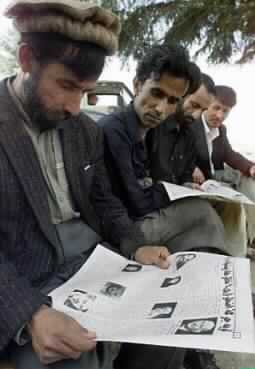HIGHLIGHTS: Ex-King Defuses Crisis Exposing His Country's Ethnic Divide||Some Ex-King Supporters Cry Foul Play on Washington's Part||Deeper Divisions Still Need to be Resolved|| STORY: Former warlords and tribal leaders gathered on Tuesday for a grand assembly to choose Afghanistan's next government as the former king renounced any role, defusing a crisis that had exposed the country's volatile ethnic divide. (Read photo caption)
About 1,550 delegates, representing a kaleidoscope of Afghan society, meet under an imported German tent at a college compound in Kabul for the opening session of the Loya Jirga at 6:30 a.m. EDT, a day later than planned.
Choosing someone to lead the country for the next 18 months ahead of general elections is the first item on the agenda and factional wrangling over that very issue delayed the start of the assembly from Monday.
Interim government leader Hamid Karzai now seems certain to be elected, having received endorsement from all the major players so far -- including former king Mohammad Zahir Shah, his partners in the interim government and former rivals.
After hours of swirling rumors and confusion, Zahir Shah announced on Monday that he would not be a candidate to lead the country and he endorsed Karzai.
SOME EX-KING SUPPORTERS THREATEN BOYCOTT
But some of his supporters have threatened to boycott the Loya Jirga, while others expressed anger and dismay about a backroom deal that pre-empted their council.
"The king's supporters were really upset and disappointed to hear the news and angered that the decision as to who will rule Afghanistan was taken outside the tent," said delegate Mohammad Gulab Mangal, a businessman from eastern Paktia province.
"We are very angry, not because of the king, but because the wishes of the people which is represented here by the delegates are not respected," said king supporter Hamayoon Shah Asifi, a delegate representing Afghans from Europe.
Some of the former king's supporters said they believed Zahir Shah had withdrawn under pressure from the United States, which wanted the current leaders to stay in power.
DEEP DIVISIONS THAT STILL NEED TO BE RESOLVED
The inauguration of the assembly was delayed ostensibly for logistical reasons such as finding out exactly who among the delegates had the right to vote.
But there are divisions and problems that go much deeper and need to be resolved to ensure that the country finds peace and stability after more than two decades of war.
The former king is seen by many as the father of the nation and the only bridge between traditionally warring tribes and those already in power who want the six-month interim administration of Western-educated Hamid Karzai to stay in place.
The king is a member of the majority Pashtun community while powerful commanders from the Tajik and Uzbek minorities dominate the interim government.
The United States and its allies are banking on the Loya Jirga to bring more stability to the country, where warlords and bandits are a continual threat to the government.
A key question has been whether the Loya Jirga will confirm the power-sharing arrangement between Karzai, who is also an ethnic Pashtun, and the ethnic minority Tajiks and Uzbeks of the Northern Alliance that forms the core of the interim government.
Some of the ethnic minority commanders are believed to see a greater role for the king as a threat to their position.
But the former king's loyalists, most of them Pashtuns, said on Monday they would boycott the Loya Jirga if he is not given a leading government role.
"No king, no Loya Jirga," said Amanuallah Zadran, the frontier affairs minister of the ex-king.
BURHANUDDIN RABBANI SUPPORTS KARZAI
Key support for Karzai also came from former Afghan president Burhanuddin Rabbani, a rival who has withdrawn his candidacy in favor of the interim leader.
"Everyone in the Northern alliance is for Hamid Karzai" and Rabbani had formally given up his candidacy, said Rahidin, a Loya Jirga candidate from Kabul.
Rabbani, 62, a white-bearded professor of Islamic law, has held and lost power several times in his career. He is firmly linked to a bloody period of rule by guerrilla factions that drove out Soviet forces in 1989 and in 1992 toppled the communist government they left behind.
PHOTO CAPTION
Afghan men look at a newspaper reporting on the Loya Jirga assembly in Kabul, June 10, 2002. Grassroots support for former King Zahir Shah has spawned political bickering among Afghanistan's chronically feuding factions, delaying the start of the grand assembly of tribal elders or Loya Jirga, officials said. (Beawiharta/Reuters)
- Author:
& News Agencies - Section:
WORLD HEADLINES


 Home
Home Discover Islam
Discover Islam Quran Recitations
Quran Recitations Lectures
Lectures
 Fatwa
Fatwa Articles
Articles Fiqh
Fiqh E-Books
E-Books Boys & Girls
Boys & Girls  Articles
Articles










